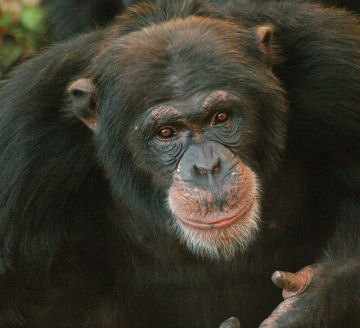Nice Chimps
Like people, chimpanzees (and babies) seem to help each other out, just because it feels good to be generous.
Share this:
- Share via email (Opens in new window) Email
- Click to share on Facebook (Opens in new window) Facebook
- Click to share on X (Opens in new window) X
- Click to share on Pinterest (Opens in new window) Pinterest
- Click to share on Reddit (Opens in new window) Reddit
- Share to Google Classroom (Opens in new window) Google Classroom
- Click to print (Opens in new window) Print
By Emily Sohn
When an animal helps out another animal, it usually gets something valuable in return. For a long time, many scientists thought that only people could behave generously just because it feels good. This kind of behavior is called altruism.
A new study in Germany, however, suggests that chimpanzees also do good deeds for no real reason. And so do children who are as young as 18 months of age. The roots of altruism, conclude the researchers, reach back 6 million years to an ancestor shared by humans and chimps.
 |
|
Scientists have discovered that chimpanzees, like this one, often act kindly toward each other, even if they get nothing back in return. |
| Max Planck Institute for Evolutionary Anthropology |
People and chimpanzees appear to develop such traits without any direct training, says Felix Warneken. He’s an anthropologist at the Max Planck Institute for Evolutionary Anthropology in Leipzig, Germany.
Warneken and colleagues worked with adult chimps that live on a protected island in the African country of Uganda. They also worked with 18-month-old children in Germany. The researchers performed three experiments with the apes and two experiments with the kids.
In the first animal experiment, a person tried to reach through the bars of an enclosure to grab a stick while a chimp watched from the room next door. The observing chimp could reach the stick if it wanted to.
Even though the animals had no previous contacts with the person, they usually grabbed the stick and gave it to the person. What’s more, they did this regardless of whether or not the person offered them banana slices as a reward. Thirty-six animals participated in this experiment, and each acted independently. No chimp saw what the other chimps had done.
In a similar trial, 36 children behaved in a similar way. They helped the person reach the stick, regardless of whether they were offered toys for their helpfulness.
The researchers conducted the second round of experiments with 18 chimps and 22 infants that had been helpful in the first round. In this set of trials, the chimps had to climb to a platform that was 2.5 meters (8.2 feet) high in order to give a stick to an experimenter. The children had to get around and over barriers to give a pencil to the person.
No rewards were offered in either case. And still, both the chimps and the children went out of their way to help.
A third set of experiments tested the willingness of nine chimps to assist other chimps that they did not know. In each trial, one animal watched another animal in a separate room. The animal being watched tried to get through a chained door to food on the other side.
The observing chimp, if it wanted to, could help out the watched chimp by removing a peg in its own room. That action would open the door in the watched chimp’s room, allowing the watched chimp to get a snack. In many trials, all the observing chimps except one decided to help their comrades.
The new results “come as no surprise to any field worker who has spent lots of time close to wild chimpanzees,” says anthropologist William C. McGrew of the University of Cambridge in England.
Still, the new study contradicts earlier findings. Researchers at the University of California, Los Angeles, for example, had found that chimps don’t give rewards of food to other chimps, even if it costs them nothing to be generous.
It’s possible that chimpanzees act altruistically only if they realize that other chimps are struggling to reach their goals, Warneken suggests.—Emily Sohn
Going Deeper:
Bower, Bruce. 2007. Ape aid: Chimps share altruistic capacity with people. Science News 171(June 30):406. Available at http://www.sciencenews.org/articles/20070630/fob7.asp .






